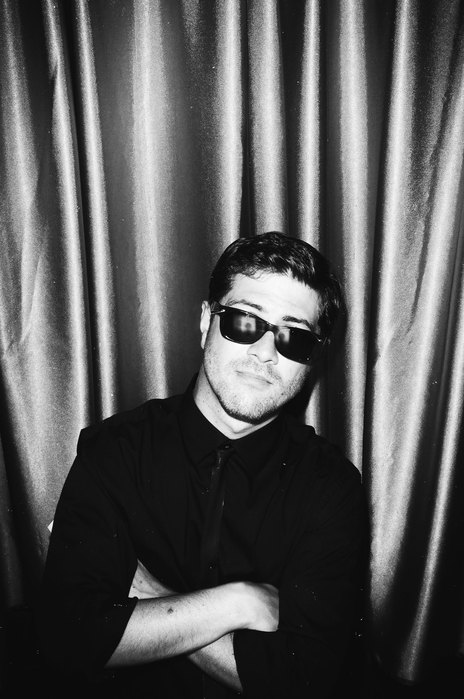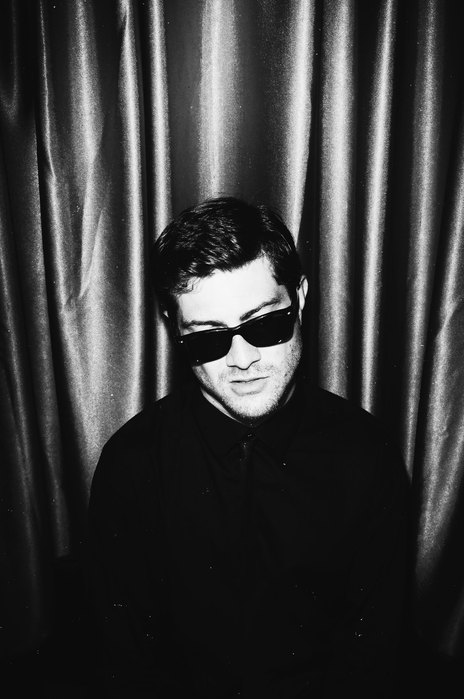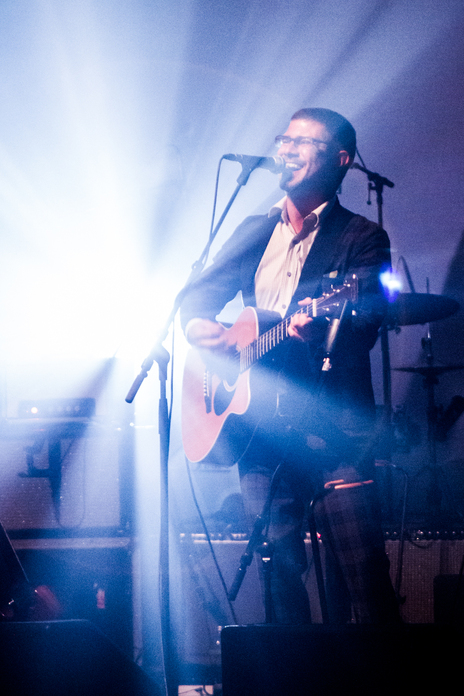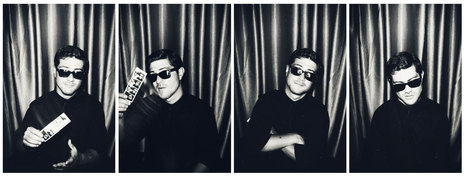Weir has always been a Wellingtonian. Apart from a short stint in Dunedin, he spent most of his time in the capital, growing up in the western suburbs. As a child he was introduced to guitar and piano by his mother, who worked in advertising and for magazines such as the Listener. His father is popular New Zealand broadcaster Dick Weir, who introduced his son to the magic of the airwaves. This experience, says Barnaby, was pivotal to his growth as an artist and musician.
Dick Weir is probably best known for producing children’s radio, including Radio New Zealand’s iconic Space Station Z. Barnaby still remembers spending weekends watching his father twiddle the knobs. “I’d go down to the old Radio NZ House on Bowen Street with him. I’d spend hours down there watching him produce, or I’d be mucking around myself.”
Weir attended Samuel Marsden, Karori Normal School, Kelburn Normal School – with a young Bret McKenzie – and later Wellington College, where he did arts, design, music, drama, film and television. A teacher, Jed Bartlet, encouraged him into music. “He was pretty influential,” Weir remembers. “He put me in the school production and that gave me the confidence to play in front of an audience.” Around this time, he and his friends started to get into dub and reggae. They liked the culture of “smokin’ weed” and were influenced by records and videos of the scene. That’s how it started but the influential pull of playing music was long lasting.
Weir went on to study at Victoria University of Wellington but spent more time in Radio Active’s production studio, making adverts and promos. He also hosted the Roots and Culture show, and Caffeine and Aspirin, which is still going strong.
Although he has worked on many projects, Weir is best known for his time fronting, along with Daniel Weetman, The Black Seeds. The band was “co-founded” in 1998, and since then has recorded five studio albums, a live album, an EP, two remix albums and 11 singles. They have also toured New Zealand, Australia, America, Europe and the Pacific.
The Black Seeds started as a Christmas party project.
The Black Seeds started as a Christmas party project. “Rich [Christie] and Shannon [Williamson] were the original instigators of the band,” says Barnaby. “We all met through Radio Active. Rich was doing sales, Shannon was a DJ and making ads. I was there, too. Daniel [Weetman] had just arrived from Gisborne. He was friends with Rich. Bret [McKenzie] and I had been friends since we went to Kelburn Normal.”
Wellington’s Marmalade Studios was in the same building as Radio Active, on Victoria St. “They were having a Christmas party, which they labelled the ‘Marmalade Jam’, inviting lots of people to make up random bands and record classic Kiwi songs. We got together as the Active’s band, I think we were called the Active Assassins, and we did Dobbo’s ‘Love You Like I Should’. It was pretty awful. We thought ‘that’ll never make the cut’. It ended up on the CD,” he laughs, “and everyone got a copy for Christmas!”
Not long after, the guys decided to become a formal band. Weir says he actually had to audition for “Rich and Shannon’s band” because he felt that was the “proper thing to do.” The first official line-up, he says, was himself, Rich, Shannon, Daniel Weetman, and Toby Laing. But there were others who helped out as well including Chris Hill (guitar), along with Dan Yeabsley (from Twinset) on sax, Joe Lindsay (Fat Freddy’s Drop) on trombone. Guitarist Mike “Fabulous” August joined around 2001. The 2018 crew is Francis Harawira, Daniel Weetman, Jarney Murphy, Nigel Patterson, Barnaby Weir and Ned Ngatae.
Weir says the band was originally created as a reggae/funk/ska/jazz/jam outfit intended as a larger live band, with individual solos intended for every player. “We were doing free-flow versions of obscure dub rhythm songs, covers, some original material. We were a dance party band. It wasn’t until the second album, Into The Dojo, that we really solidified the line-up and the sound.”
Lee Prebble has always been the Black Seeds’ “silent partner”.
The “Dojo”, of course refers to Lee Prebble’s Newtown studio, The Surgery, where the Band’s albums were produced. Prebble has always been the band’s “silent partner”.
“We were starting to become a real band at this point, actually have our own songs and regular rehearsals. We were rehearsing at Rich’s in his garage. It was quite a big carpark in a Wellington apartment block. On a Sunday at 3pm, we’d pick up the amps from his house and go down in the lift and everyone’s kind of going about their Sunday thing. We’d set up in the corner of the garage, totally blasting the whole space. He’d got permission from the landlord and we made a lot of noise for about two hours.”
Weir was also playing around with Dub Connection, who performed in Wellington a few times including at Radio Active’s One Love Festival, held in the Civic Square about 1999 on Bob Marley’s birthday (which is also Waitangi Day).
He was also “tinkering” with beats at the Active studios after hours. That project went on to be released as the Flash Harry album, which he released in 2002, on the late Sir Lloyd Morrison’s Capital Recordings. Weir remembers meeting with Morrison, who usually released classical recordings on the label. A year later Dub Connection put out a 12-inch EP, which was a split release: Flash Harry vs. The Video Kid.
“Our first album [Keep On Pushing – Loop Recordings] was released in 2001. It was actually made the year before but we chose that date then to coincide with the big Y2K ‘scare’ of the time. Then, it was all about the physical CD. It was before the streaming phenomenon took off.” The follow-up album Into the Dojo went to No.1, selling 45,000 copies.
The Black Seeds was not Weir’s only project. In 2004, alongside Loop Recordings’ main man Mikee Tucker, he co-founded a new gig, Fly My Pretties, which was intended to showcase musicians in Wellington and farther afield. The first show was held in Bats Theatre, featuring local talent such as Age Pryor (Wellington International Ukulele Orchestra), Tessa Rain, Nathan “Nato” Hickey, Adi Dick, Brendan Moran, and Black Seeds Jarney Murphy, Mike Fabulous and Nigel Paterson.
Since then the ever-changing collective has released six albums and several EPs and singles. They have toured New Zealand and Australia, playing large festivals such as Womad in Taranaki.
The main point of the show is still the same, says Weir: “To collaborate and showcase different talent with a spellbinding visual backdrop. But now we have so much great material, it’s become a much bigger and broader experience than when we first started. I am so lucky to have worked and made friends with a range of awesome people over the years. It still gives me a kick.”
FMP has not only toured New Zealand but also done a handful of shows in Australia, including the Byron Bay Bluesfest. “Our show does translate pretty well to the festival environments, but we are always working on a new theatre production and album, which is where I think our show is best suited. This is because when you have a big group of artists there needs to be a concept to tie it all together.”
Fly My Pretties has had some unique and ambitious concepts.
Over the years, FMP has had some unique and ambitious concepts. Their second show series (The Return Of …) was dedicated to the pioneer spirit, with the band dressed in Victorian garb and supported by vintage images and snippets from the Film Archive. A later show called Fly My Pretties: A Story was developed around a short story with an ecological theme, delivered each night by Dick Weir.
In 2006, along with Hollie Smith, Alda Rezende, Maaka Phat (Wai), P. Diggs (Shapeshifter), and producer Recloose he took part in the Bacardi B-Live OE: Brazil project. This involved travelling to San Paulo, Brazil to record with local artists such as The Zimbo Trio and Apollo Nove, before returning home to take part in a series of shows across New Zealand.
Weir released his first album under his own name in 2011: Tarot Card Rock (EMI). Around that time The Black Seeds had just completed their fifth album, and Weir wanted to branch out and explore his “American roots” side. Material for the album was mainly written by Weir with long-time friend Craig Terris (Cassette), and also included two songs written with veteran Dutch country outfit Rootsclub, and one from a recent Fly My Pretties session (‘Old Friend’).
As with many of the Black Seeds and FMP albums, Weir involved evergreen engineer “Dr” Lee Prebble, who mixed tracks Weir had recorded as demos at his “house on a hill”: the iconic Surgery Studios in Roseneath.
In 2012, Weir was briefly hospitalised after contracting myocarditis, a virus that attacks the heart.
When he’s not touring he helps out at his mother’s café and bar Poquito, in Tory St, Wellington, and DJs there on occasion.





